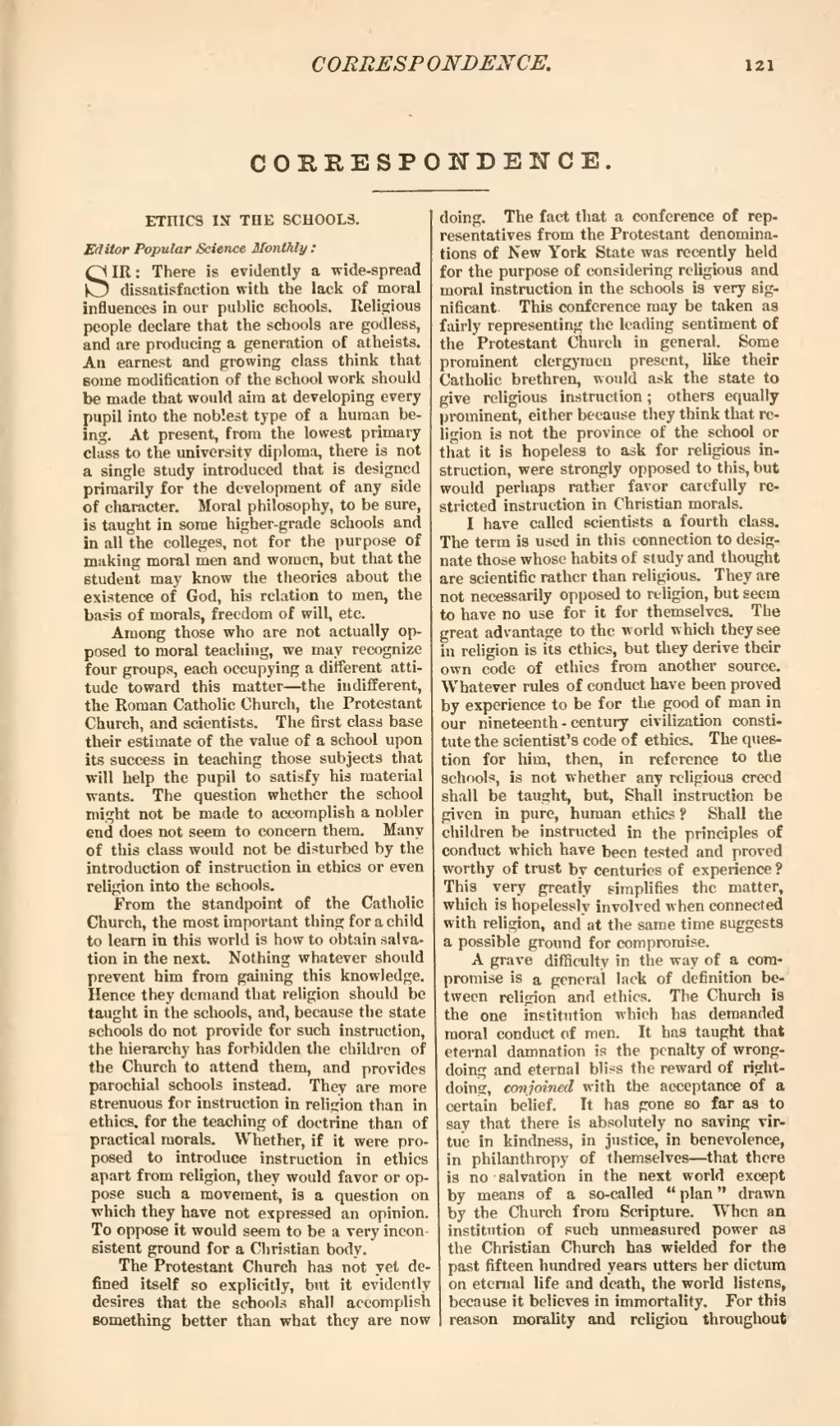ETHICS IN THE SCHOOLS.
Editor Popular Science Monthly:
SIR: There is evidently a wide-spread dissatisfaction with the lack of moral influences in our public schools. Religious people declare that the schools are godless, and are producing a generation of atheists. An earnest and growing class think that some modification of the school work should be made that would aim at developing every pupil into the noblest type of a human being. At present, from the lowest primary class to the university diploma, there is not a single study introduced that is designed primarily for the development of any side of character. Moral philosophy, to be sure, is taught in some higher-grade schools and in all the colleges, not for the purpose of making moral men and women, but that the student may know the theories about the existence of God, his relation to men, the basis of morals, freedom of will, etc.
Among those who are not actually opposed to moral teaching, we may recognize four groups, each occupying a different attitude toward this matter—the indifferent, the Roman Catholic Church, the Protestant Church, and scientists. The first class base their estimate of the value of a school upon its success in teaching those subjects that will help the pupil to satisfy his material wants. The question whether the school might not be made to accomplish a nobler end does not seem to concern them. Many of this class would not be disturbed by the introduction of instruction in ethics or even religion into the schools.
From the standpoint of the Catholic Church, the most important thing for a child to learn in this world is how to obtain salvation in the next. Nothing whatever should prevent him from gaining this knowledge. Hence they demand that religion should be taught in the schools, and, because the state schools do not provide for such instruction, the hierarchy has forbidden the children of the Church to attend them, and provides parochial schools instead. They are more strenuous for instruction in religion than in ethics, for the teaching of doctrine than of practical morals. Whether, if it were proposed to introduce instruction in ethics apart from religion, they would favor or oppose such a movement, is a question on which they have not expressed an opinion. To oppose it would seem to be a very inconsistent ground for a Christian body.
The Protestant Church has not yet defined itself so explicitly, but it evidently desires that the schools shall accomplish something better than what they are now doing. The fact that a conference of representatives from the Protestant denominations of New York State was recently held for the purpose of considering religious and moral instruction in the schools is very significant. This conference may be taken as fairly representing the leading sentiment of the Protestant Church in general. Some prominent clergymen present, like their Catholic brethren, would ask the state to give religious instruction; others equally prominent, either because they think that religion is not the province of the school or that it is hopeless to ask for religious instruction, were strongly opposed to this, but would perhaps rather favor carefully restricted instruction in Christian morals.
I have called scientists a fourth class. The term is used in this connection to designate those whose habits of study and thought are scientific rather than religious. They are not necessarily opposed to religion, but seem to have no use for it for themselves. The great advantage to the world which they see in religion is its ethics, but they derive their own code of ethics from another source. Whatever rules of conduct have been proved by experience to be for the good of man in our nineteenth-century civilization constitute the scientist's code of ethics. The question for him, then, in reference to the schools, is not whether any religious creed shall be taught, but, Shall instruction be given in pure, human ethics? Shall the children be instructed in the principles of conduct which have been tested and proved worthy of trust by centuries of experience? This very greatly simplifies the matter, which is hopelessly involved when connected with religion, and at the same time suggests a possible ground for compromise.
A grave difficulty in the way of a compromise is a general lack of definition between religion and ethics. The Church is the one institution which has demanded moral conduct of men. It has taught that eternal damnation is the penalty of wrong-doing and eternal bliss the reward of right-doing, conjoined with the acceptance of a certain belief. It has gone so far as to say that there is absolutely no saving virtue in kindness, in justice, in benevolence, in philanthropy of themselves—that there is no salvation in the next world except by means of a so-called "plan" drawn by the Church from Scripture. When an institution of such unmeasured power as the Christian Church has wielded for the past fifteen hundred years utters her dictum on eternal life and death, the world listens, because it believes in immortality. For this reason morality and religion throughout

